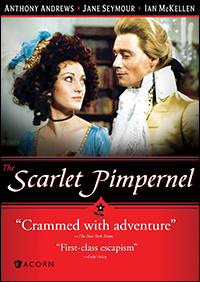
*
Baz Luhrmann's Strictly Ballroom [Lionsgate]—the Australian film that opened in 1992 and immediately established the director as a presence in the world cinema—has just been released on Blu-ray. Never having heretofore gotten around to seeing it, I discover that it is pure delight: a heartwarmingly uplifting terpsichorean Cinderella combining exhilarating dance and witty humor that alternates from the sly to the brash. This was the first in Luhrmann's so-called Red Curtain Trilogy of highly theatrical films with a theatrical motif, the others being "William Shakespeare's Romeo + Juliet" and "Moulin Rouge."
The story is simple enough, telling of a talented twentyish ballroom dancer (Paul Mercurio) in small-town Australia who has grown up in the shadow of an overbearing dance-teaching mother. A likely-to-be champion in the Pan Pacific Grand Prix championships, he loses his partner due to his predilection to improvise his own, exciting-but-unauthorized steps. Searching for self-expression, he begins working with the sad sack of the troupe (Tara Morice), with thick glasses and a perennial smudge on her face. We all know what happens, yes; but it happens with grace, charm, humor and even slippers (of the dance variety).
Luhrmann was the son of a small-town ballroom dancing teacher, himself engaging in the activity while growing up, so he knows the milieu. The theatrical roots of the film are inherent. Luhrmann and friends at the National Institute of Dramatic Arts in Sydney developed a brief stage version of the piece in 1984. He then went on to do an expanded version in Bratislava [Czechoslovakia] in 1986, and a final version in 1988 at the Wharf Studios in Sydney. Record producer Ted Albert saw the play, loved it, and decided to film it; Luhrmann agreed as long as he himself was hired to direct.
The project underwent a long and difficult journey, which included the death of Albert prior to filming. The oddball movie, once finished, found it difficult to attract suitors (or distributors). In a ridiculously Cinderella-like parallel, "Strictly Ballroom" was given a slot at the 1992 Cannes Festival. But a back-door slot: one midnight showing, which was sparsely attended but received a vociferous 15-minute ovation. This resulted in additional screenings and furious bidding for the rights. Miramax won, and you can figure out the rest. There has been talk of a new stage version, which would fit right in on Broadway and which under the circumstances certainly makes sense. But "Strictly Ballroom" is instantly available, now, and the new Blu-ray shows off the stunning production design by Catherine Martin and costumes by Angus Strathie. I waited almost 20 years to see the film, which I realized—15 minutes in—was an ill-advised delay.
 |
||
| Cover art |
Viewers who enjoyed the telecast will be especially pleased with three hours-worth of bonuses. These include extended interviews with Harnick, Sondheim, Kander, Strouse, Prince, Yeston, Phyllis Newman, Margaret Styne and Jo Sullivan Loesser, along with children of Berlin, Rodgers, Bernstein, Harburg and Dorothy Fields. There are also three songwriter demonstrations taken from the interviews: Stephen Schwartz doing "Magic to Do" (from Pippin), Marc Shaiman singing "A Doctor, A Doctor" (a song celebrating his sister's wedding), and Amanda Green—lyricist/composer of the recent Hands on a Hardbody, and daughter of the fabled Adolph—giving an a cappella rendition of the Comden-Green-Styne "If You Hadn't But You Did."
 |
||
| Cover art |
For those in search of something in the swashbuckling department, we have the 1982 TV version of The Scarlet Pimpernel. Not quite the same as watching the old Leslie Howard film, but this Clive Donner production adds color and dash to the mix. The stars, too, enhance the fun. Anthony Andrews, who had just graduated from "Brideshead Revisited," is British fop Percy Blakeney. (Spoiler: he is really that "demned illusive" Scarlet Pimpernel, waging his own underground war against the evils of the French Revolution.) Jane Seymour plays his French-born wife Marguerite St. Just, who doesn't understand why her husband presents such a foolish face to the world. The better to hide his true identity, of course; but "Pimpernel"—which began life as a play in 1903, followed by a series of novels—seems to have been the first major piece of fiction to devise the plotline of the meek-mannered milquetoast/nebbish who is really a super man. Or even a Superman or Zorro or Batman, etc.
Representing the blood-thirsty revolutionaries and eating up French and British scenery is Ian McKellen as the villainous Chauvelin. He does not get the girl, and he wants every passing "aristo" to pay. If McKellen and Seymour display crackling chemistry, it is not without reason; they filmed this TV movie just after starring together as Salieri and Constanze in the original 1980 Broadway cast of Amadeus.
(Steven Suskin is author of "Show Tunes" [Oxford], “The Sound of Broadway Music: A Book of Orchestrators and Orchestrations,” “Second Act Trouble,” the "Broadway Yearbook" series and the “Opening Night on Broadway” books. He can be reached at ssuskin@aol.com.)

Jeremy-Daniel.jpeg)







